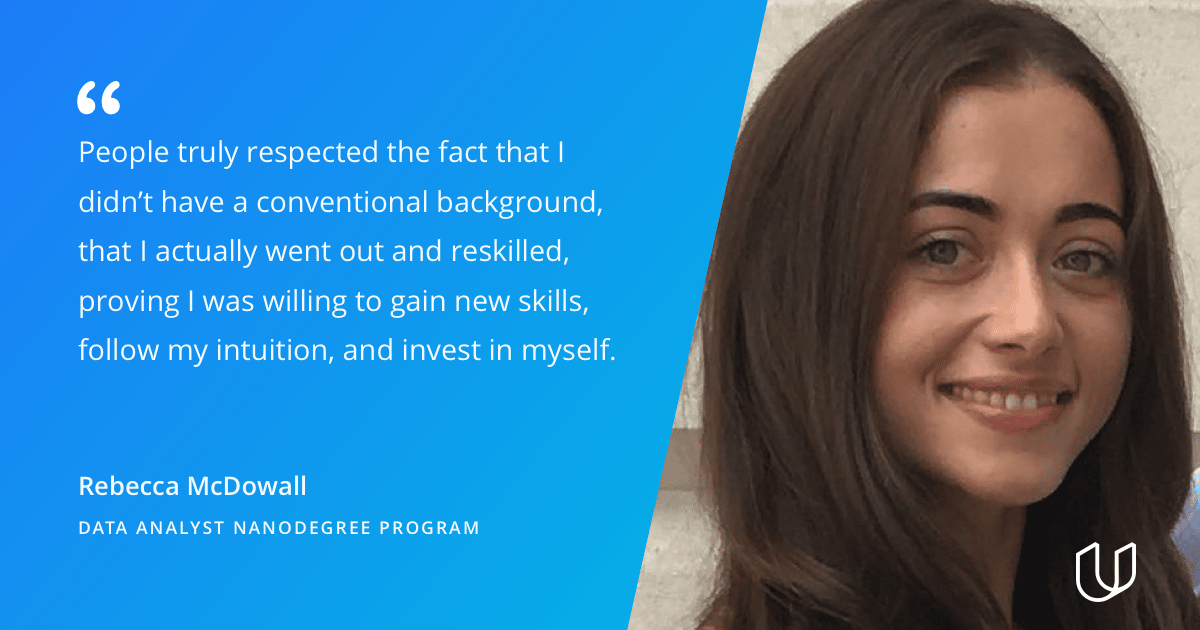Find the right nanodegree program for you.
Throughout Women’s History Month we’ve introduced you to five incredible women over the past few weeks who have taken the idea of balance to a whole new level; showing us how, no matter what your calendar looks like, it is possible to balance your job, social, and extracurricular activities while pursuing career advancement and new skills.

Rebecca McDowall succeeded in changing careers and landing a new job at a top tech company, Accenture. Today, she is analyzing the healthcare sector, looking for ways to improve the data of today for a better healthcare industry of tomorrow. We had a chance to speak with her and learn more about her journey.
Have you always been interested in data?
In a way, yes. I graduated from university in 2016 with a degree in mathematics and statistics. Initially, I chose math purely based on my interest in statistics; I loved the real-world applicability and how you can find data in relatively any part of life. But, I didn’t love the mathematics portion of the degree and when I graduated and started looking for jobs, I felt pretty lost.
Were you interested in any industry or particular job?
My mother works in healthcare and I always had an awareness of how important, yet stressful her job could be. I had a keen interest in trying to work alongside healthcare, possibly healthcare economics. Though I looked, I couldn’t find any entry-level positions based on my degree, so I ended up taking a job as an audio typist for the histopathology department whilst trying to gain internship experience in healthcare economics
I knew this wasn’t what I wanted to be doing, but I also knew it was a job in the industry I was curious about. After a few months, I became frustrated; it was boring and didn’t offer any true advancements further into the industry. A friend had also shared a website that detailed jobs of today that might be replaced by technology in the future, and my job was one of them. This got me thinking: how was technology evolving and how could I take advantage of emerging skills?
How did you decide on what skills/topics to pursue?
I started to take another look at what I had learned in my university years, particularly, any experience with coding. Having dabbled a bit in MATLAB, I figured I could find something that involved coding, data, and healthcare. I searched online and found a few options, but Udacity really stood out to me since I was looking for a way to gain new skills that would put me in a better position to start a career in tech.
I did a bit more research and landed on the Data Analyst Nanodegree program. The flexibility to learn at your own pace, in my case, while working full-time, interact weekly with a mentor, and meet fellow students in similar positions, were really appealing factors. My family was a bit unsure, but I reiterated the positive aspects and added that firms like Google were helping to create the content.
How did those first few lessons go? Was it as expected?
I loved the fact that the course started with Python. As a newbie, I needed a foundation in this language, but it was hard! I just kept telling myself that it would stick eventually and to continue plugging along. And, it did.
I fell in love with the concepts—Tableau and R were especially great. I was learning the real-world applicability of data I had been looking for. The projects were challenging me to take unorganized data, clean it, and analyze it to create visualizations.
How did you overcome challenging portions of the Nanodegree program?
I found that asking questions on Slack and the forum was really helpful. The community of students was so supportive and inspiring.
Initially, when I thought about getting involved in this industry, I considered local meetups, but it was too intimidating to imagine going to an in-person event and being the attendee without a computer science background and possibly the only female. With the Slack community, I felt confident in my evolving skills. Moreover, my mentor continued to support my progress and inspire me to continue.
When did you begin thinking about applying for jobs?
Towards the end of the course, when I was able to wrangle large sets of data, that was the turning point. I started to think about actually applying to jobs.
How did the search go?
Initially, I was super intimidated. Yes, I had the skills, but my background wasn’t traditional. I began applying and interviewing. One of the first companies I heard back from was Accenture.
The interview was awesome and unconventional. I actually attended a four-day technology visionary event where I was challenged to solve problems with other interviewees and had a chance to meet and network with current Accenture employees. The most exciting part about the event was the attendees (pictured below) – 90% of them, being women which supports Accenture’s latest initiative in gender diversity. One of the highlights was actually meeting Zahra Bahrololoumi, Senior Managing Director – Technology at Accenture, and seeing her own enthusiasm for women in tech. I was incredibly impressed and even more interested in working for them.
A historic moment! 90% of delegates on our Tech Visionaries programme are female @Accenture @AccentureTech @accentureukjobs @YannLepant #techempowerment @yvesbernaert @phill_wallace pic.twitter.com/V8WkHIiftk
— Zahra Bahrololoumi (@ZahraS_B) April 3, 2018
From a skills standpoint, they were really interested in my Tableau experience and my ability to take bad data, clean it, and make it usable. As the initial questions about my skills came and went, I started to realize that people truly respected the fact that I didn’t have a conventional background, that I actually went out and reskilled, proving I was willing to gain new skills, follow my intuition, and invest in myself.
Accenture ended up offering me two different projects to choose from, banking or healthcare. Obviously, I chose healthcare. I couldn’t be happier! Today, I am building a metadata platform that’s aimed at reducing the data burden across the healthcare industry.
That’s incredible; you achieved exactly what you set out for!
Thank you! It’s crazy to think that a year and a half ago, I was a typist, and today I’m a Data Analyst, making real changes to the healthcare industry. It really came down to making the decision to learn new skills. When I enrolled in the program, I committed to working every night and dedicating a lot of my weekends to the course work. It was hard, but I believed it was going to give me the career opportunity I wanted.
In the end, I was honestly shocked by how much of an impression you make on people when you go after a new career and prove you can learn completely new skills. It can be so intimidating when you feel like you don’t have a computer science degree, but that assumption is so far from the truth.
Do you see yourself continuing to challenge your skill set?
Long term, I see myself building my experience at Accenture and continuing to learn about healthcare and beyond! The idea of helping businesses understand and make use of their data is inspiring. I could see myself being a consultant in the future and doing something on my own by applying data to healthcare issues, but for now, I am learning so much and truly enjoying my work.
—
Congratulations, Rebecca! Thank you for affording us the opportunity to share you success. Your tenacity, hard work and pursuit of knowledge are truly inspiring and a wonderful final installment to this year’s Women’s History Month blog series. We heard from an accomplished data analyst, digital marketer and react programmer, as well as, a super-mom turned programmer, and an artificial intelligence engineer. These women continue to show each of us the power of determination and the importance of lifelong learning!



